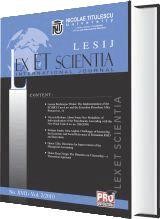ROMANIA'S MACROECONOMIC ACHIEVEMENTSFOR JOINING THE UNIQUE EUROPEAN CURENCY
ROMANIA'S MACROECONOMIC ACHIEVEMENTSFOR JOINING THE UNIQUE EUROPEAN CURENCY
Author(s): Silvia Mihaela PopescuSubject(s): Economy
Published by: Universitatea Nicolae Titulescu
Keywords: Euro currency; the economic depression; stability of exchange rate; monetary policy; the financial depression
Summary/Abstract: The Romanian government has announced plans to join the eurozone by 2015. Currently, the leu is not yet part of ERM II but plans to join in 2010-2012. The economic advantages of the monetary union grow with expansion of the Euro zone. There is also a high level of skepticism; the main fear about the Euro is the inflation –that is considerable promoted by the Euro currency’s exchange rate in comparison with 2002; another restraint is due to member states inability to establish their own interest rates. The IMF arose the option of joining the Euro zone criteria relaxing. A one-sided Euro’s joining was suggested by International Monetary Fund on March-April 2009, in a confidential report mentioned by The Financial Times as the emergent states in Central and Eastern Europe to be able to pass to the unique currency, but not being represented in the Central European Bank Board. By its side, CEB considers that emergent states of the European Union must not pass to the unique currency unilaterally, because such a fact could under-mine the trust in Euro currency worldwide. This option would hardly deepen the macroeconomic controversies inside the Euro zone and would contradict the previous conditions already imposed. An acceptable solution could be the fastening of emergent countries joining the Exchange Rate Mechanism 2, after they are aware of risks arisen by such a step. The European Commission endorses in the Convergence Report on 2010 that Romania doesn’t meet any criteria needed by passing to the unique European currency, respectively: prices stability; budget position of the government; stability of exchange rate; interest convergence on long run and there are also law impediments. Our paper discusses arguments for a faster passing to the Euro currency versus arguments for a late joining the Euro currency in Romania.
Journal: LESIJ - Lex ET Scientia International Journal
- Issue Year: XVIII/2011
- Issue No: 1
- Page Range: 243-251
- Page Count: 9
- Language: English

